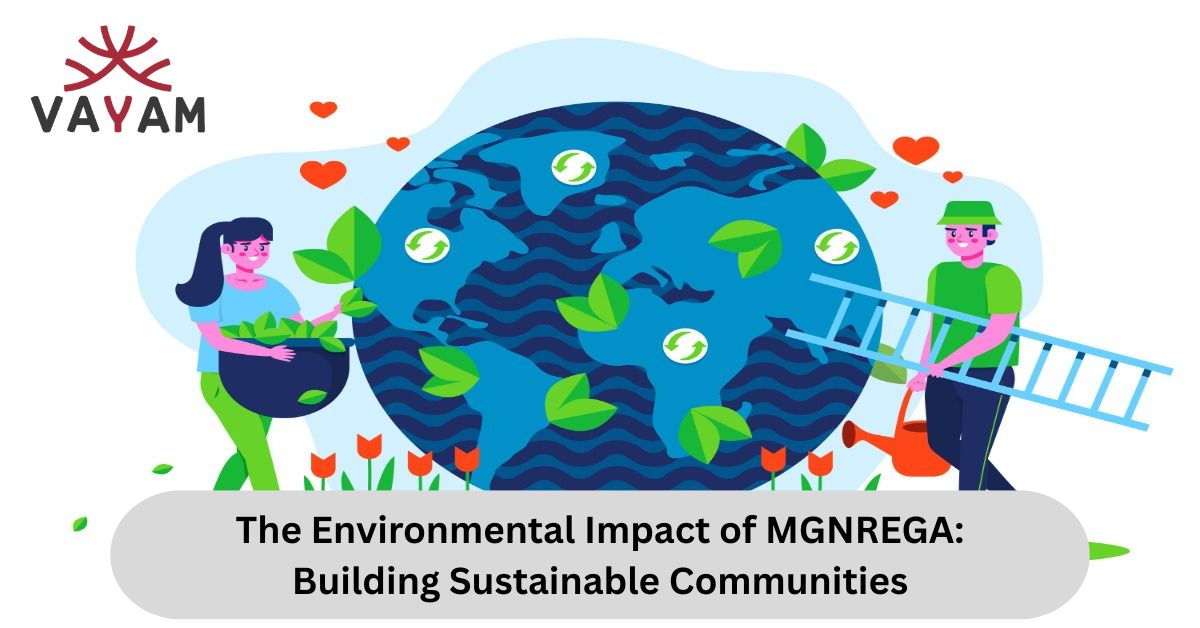
As the world grapples with the challenges of climate change, environmental degradation, and social inequality, it’s essential to examine the role of government initiatives in promoting sustainability. One such program that has been making waves in India is the Mahatma Gandhi National Rural Employment Guarantee Act (MGNREGA). While its primary objective is to provide rural employment, MGNREGA has also been instrumental in promoting environmental conservation and building sustainable communities.
What is MGNREGA, and How Does it Work?
MGNREGA is a social security program launched by the Indian government in 2006. It guarantees 100 days of wage employment in a financial year to every rural household whose adult members volunteer to do unskilled manual work. The program aims to enhance livelihood security, reduce poverty, and promote sustainable development.

The Environmental Benefits of MGNREGA
MGNREGA has been instrumental in promoting environmental conservation and sustainability in rural areas. Some of the key environmental benefits of the program include:
- Water Conservation: MGNREGA has been instrumental in promoting water conservation by creating water harvesting structures, ponds, and canals. These structures help in recharging groundwater, reducing runoff, and increasing water availability for agriculture and drinking purposes.
- Soil Conservation: The program has also been promoting soil conservation by creating contour trenches, bunds, and check dams. These structures help in reducing soil erosion, increasing soil fertility, and promoting sustainable agriculture practices.
- Afforestation and Reforestation: MGNREGA has been promoting afforestation and reforestation efforts by planting trees on public lands, community forests, and individual farms. This helps in increasing green cover, promoting biodiversity, and reducing carbon emissions.
- Renewable Energy: The program has also been promoting the use of renewable energy sources like solar power by creating solar-powered infrastructure in rural areas.

While MGNREGA has been instrumental in promoting environmental conservation, there are several pain points that need to be addressed. Some of the key challenges include:
- Lack of Awareness: Many rural communities are not aware of the environmental benefits of MGNREGA. Solution: Conduct awareness programs and training sessions to educate rural communities about the environmental benefits of the program.
- Inadequate Funding: MGNREGA projects often face funding constraints, which can impact their effectiveness. Solution: Increase funding for MGNREGA projects and explore alternative funding sources like CSR funds and international grants.
- Poor Implementation: In some cases, MGNREGA projects are not implemented effectively, which can impact their environmental benefits. Solution: Strengthen project implementation by engaging local communities, conducting regular monitoring and evaluation, and providing training to project staff.
Success Stories
MGNREGA has been instrumental in promoting environmental conservation and building sustainable communities in rural India. Some of the success stories include:
- Water Conservation in Rajasthan: MGNREGA has been instrumental in promoting water conservation in Rajasthan by creating water harvesting structures and canals. This has helped in recharging groundwater and increasing water availability for agriculture and drinking purposes.
- Afforestation in Andhra Pradesh: The program has been promoting afforestation efforts in Andhra Pradesh by planting trees on public lands and community forests. This has helped in increasing green cover, promoting biodiversity, and reducing carbon emissions.

The Way Forward
MGNREGA has been instrumental in promoting environmental conservation and building sustainable communities in rural India. To further enhance its impact, it’s essential to:
- Increase Funding: Increase funding for MGNREGA projects to ensure their effective implementation and sustainability.
- Strengthen Project Implementation: Strengthen project implementation by engaging local communities, conducting regular monitoring and evaluation, and providing training to project staff.
- Promote Awareness: Conduct awareness programs and training sessions to educate rural communities about the environmental benefits of MGNREGA.
Conclusion
MGNREGA has been instrumental in promoting environmental conservation and building sustainable communities in rural India. By addressing the pain points and challenges, we can further enhance its impact and promote sustainable development.
As we move forward, it’s essential to prioritize environmental conservation and sustainability in our development efforts. By working together, we can build a more sustainable future for all.
Read More
Top 5 MGNREGA Success Stories You Need to Know
Understanding MGNREGA’s Unemployment Allowance: Are You Eligible?
How MGNREGA is Boosting Local Dairy Farming Businesses?
Frequently Asked Questions
Q: What is MGNREGA, and how does it work?
A: MGNREGA is a social security program launched by the Indian government in 2006. It guarantees 100 days of wage employment in a financial year to every rural household whose adult members volunteer to do unskilled manual work.
Q: What are the environmental benefits of MGNREGA?
A: MGNREGA has been instrumental in promoting environmental conservation and sustainability in rural areas. Some of the key environmental benefits include water conservation, soil conservation, afforestation and reforestation, and renewable energy.
Q: What are the pain points and challenges in implementing MGNREGA?
A: Some of the key challenges include lack of awareness, inadequate funding, and poor implementation.
Q: How can we further enhance the impact of MGNREGA?
A: To further enhance its impact, it’s essential to increase funding, strengthen project implementation, and promote awareness about the environmental benefits of the program.
